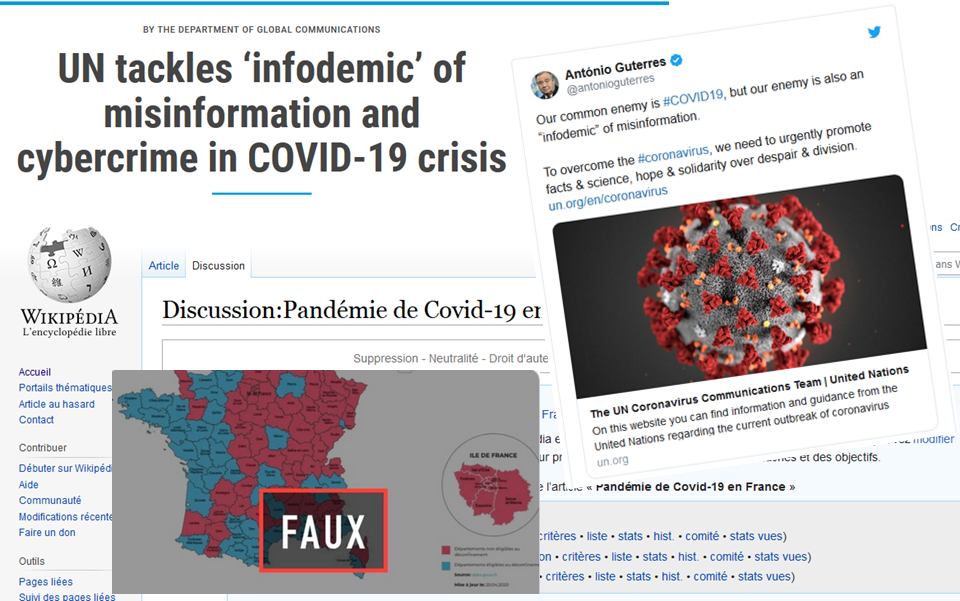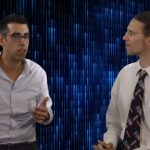Wikipedia in the time of the Covid-19 crisis
Wikipedia provides freely reusable, objective and verifiable content that every citizen may modify and improve. It is difficult to achieve this aim when it comes to providing real-time information about a crisis marked by uncertainty, as is the case with the current Covid-19 epidemic. At Télécom Paris, Caroline Rizza, a researcher in information sciences, and Sandrine Bubendorff, a sociologist, have explored how crises are approached on Wikipedia – a topic they have been studying for three years through the ANR MACIV project. In this joint interview, they explain the motivations for producing content about the health crisis by comparing it to more short-term crises, such as the attacks of 13 November 2015 in Paris.
Why study Wikipedia in crisis situations?
Sandrine Bubendorff: In our research, we examine how information spreads in crisis situations. And Wikipedia is a place where articles are created very quickly when an event occurs, with a goal: summarize the information available. So we look at how this summary is constructed. This allows us to analyze the way in which information is spread and aggregated about an event as it unfolds. For instance, how do the contributors deliberate in real time about what constitutes a reliable source? The idea is to understand how the Wikipedia page can help make sense of the events.
On Wikipedia, is the current health crisis approached like any other crisis?
Caroline Rizza: Our research on Wikipedia began by studying what are referred to as civil security crises. We focused in particular on the attacks of 13 November 2015. We studied the dynamics of creating pages, debates between contributors about what makes a source reliable or unreliable, strategies for building tree structures to best present the information etc. A defining characteristic of civil security crises is that they take place over a short period of time. Whether it’s a matter of an attack, flooding or an industrial accident, the crisis is usually short-lived: whether it’s “anticipated” or unexpected, we observe that the crisis intensifies and peaks rapidly with a “return to normalcy” in the hours or days follow. The time frame for our current health crisis is different. The crisis intensifies, then levels off and plateaus without any real way of predicting when things will return to normal. As a result of this plateauing, a variety of mechanisms come into play on Wikipedia, some of which are unique to crisis situations, and others that are more similar to questions raised for more common topics.
Read more on I’MTech: Social media and crisis situations: learning how to control the situation
What are the typical mechanisms for producing knowledge about crises on Wikipedia?
SB: The first characteristic is that a page is created for the event very quickly with a basic summary of information. For the attacks of 13 November for example, the first entry on the page was “Shooting in the 11th arrondissement, live coverage on BFM TV”. Less than five minutes later, it was corrected by another person to change the term “shooting” and remove the reference to BFM TV. In situations like this, we observe that information is constructed very quickly and in an iterative way. This can also be seen in the pages about the Covid-19 epidemic.
There is also a flurry of activity to create secondary pages on Wikipedia: the ones that allow members of the community to interact with one another. The initial discussions are usually about whether or not it is appropriate to create a page dedicated to the topic: are the events significant enough to appear in an encyclopedia? Such debates impact the architecture of pages about events: does a given sub-event deserve to have a dedicated page? For example, in the case of the Covid-19 crisis, we’re seeing debates about whether each country should have its own dedicated page for the situation, or if all the information should instead be centralized on a single page. These debates are interesting since they give us the opportunity to understand how events are organized hierarchically. And as always on Wikipedia, this desire to produce encyclopedic, lasting knowledge.
Why are there debates about whether or not to create pages about certain topics?
CR: What’s unique about crisis topics on Wikipedia is that there is an influx of new contributors to provide information about the topic, probably due to the unfolding nature of the crisis. This means that the community of editors will not be composed solely of regular editors, and that there will be opposing viewpoints. New contributors are likely to produce content very quickly and provide information about a topic using a journalistic approach. The more regular contributors we interviewed reported that they have a specific approach for this type of article, which is to not intervene immediately. They wait a day or a few days, until the contributions level off so that they can thoroughly revise the article in terms of both content and form. So they use more of an encyclopedic approach. They think about presenting the event from a knowledge perspective: the information must stand the test of time.
What are the different ways in which Wikipedia contributors approach topics?
SB: For the regular contributors we’ve met, the urgent need is not to report information, but rather to provide a synthesis of information. In general, Wikipedia only deals with secondary sources. The information must exist elsewhere in order to be cited on Wikipedia, and there must be a consensus about its sources. The content presented must therefore be verified and credible, which calls for a different time frame than putting information from “primary sources” online. For pages dedicated to crisis situations, regular contributors generally only intervene after content produced at the same time the crisis is unfolding has leveled off. They edit the information, eliminating side notes and keeping only a summary of important information, by restructuring pages, improving sources etc.
As an example of this issue, there was a debate about the best source to use to provide figures concerning the numbers of Covid-19 cases and deaths. Such a discussion exemplifies the contrast between approaches that can be described as encyclopedic or journalistic. Each country updates and reports its data on a daily basis. However, the WHO updates its figures with a 24 to 48 hour delay since it needs time to aggregate the data. So on Wikipedia, there is a debate about which data to take into account. Ultimately, so far the consensus has weighed in favor of the WHO figures, even if they come with a delay. This was the consensus reached between the contributors.
At the top of the French Wikipedia page about the Covid-19 epidemic, two banners are displayed to warn readers about the possible lack of information. The first is specific to the current health crisis, while the second is displayed on all pages concerning current events.
Are there unique aspects as to how the health crisis is being approached on Wikipedia ?
SB: There are two differences between the Covid-19 crisis and civil security crises such as: its time frame and its scientific dimension. Because it is taking place over a long period of time, the debates also continue over time. Although the crisis began several months ago, the pages still display specific banners warning readers that the information may be inaccurate or obsolete, and that it relates to current events. These banners are very interesting because they attest to the construction of encyclopedic knowledge in real time. Behind-the-scenes debates are playing out between contributors to determine which scientific sources to take into account: should only published scientific articles be discussed? Should articles that are currently being peer-reviewed be incorporated? All these questions illustrate how the community produces information that will stand the test of time and. And ultimately they are similar to the debates we observe between Wikipedia contributors for “non-crisis” articles. Scientific articles, publications, are sources that Wikipedians are accustomed to using and discussing.
Why do so many people readily volunteer to provide such encyclopedic information?
CR: One of the ideas that has emerged in our research on crises is that citizens contribute in order to make sense of what is happening, and to fill an information vacuum. To be more specific, like other researchers, we have noted that any crisis comes with its share of uncertainty. This uncertainty results in anxiety among citizens. Faced with such uncertainty and the anxiety it causes, citizens attempt to “solve” these questions. They try to understand what’s happening and what should be done, and even what they should or could do. They come together, communicate using their smartphones and organize groups on social media. This is exactly what we have demonstrated with Wikipedia: in the absence of effective communication about the crisis, citizens are plunged into uncertainty, which they try to resolve by coproducing encyclopedic informational content. Working as a community — debating information sources and quality — therefore allows them to find some small degree of certainty amidst an overwhelming amount of sometimes contradictory information that is being spread, and ultimately, to fill an information vacuum that leaves the door open to rumors or misinformation. We’re seeing this today and there’s a good reason why the Covid-19 pandemic has been coupled with the idea of an “infodemic.”
Is Wikipedia the only platform that makes this possible?
CR: No, we talk about Wikipedia but this is also something we’ve seen in our research on Twitter. Ultimately, what we’ve demonstrated about this topic through the ANR MACIV project we’re working on is that despite the main purposes of each of these media — to construct encyclopedic knowledge on Wikipedia and to disseminate information on Twitter — citizens are very attentive to the truthfulness of information. They develop intrinsic verification mechanisms: in the comments on posts in Twitter feeds for example, and on the talk page of a Wikipedia article. As such, we have suggested that Wikipedia represents a “digital social network” during a crisis, in the same way as Twitter or Facebook, in light of the extensive activity on the talk page about the crisis.
Interview by Benjamin Vignard, for I’MTech.
[divider style=”normal” top=”20″ bottom=”20″]
MACIV: social media in crisis situations
Caroline Rizza and Sandrine Bubendorff are researchers at the Interdisciplinary Institute of Innovation, a joint research unit (UMR 9217) between Télécom Paris/CNRS/École Polytechnique/Mines ParisTech. They are working on the MACIV project (MAnagement of CItizens and Volunteers: social media in crisis situation), for which Caroline Rizza is the scientific coordinator. The project is funded by the ANR via the French General Secretariat for Defense and National Security. Since 2018, the MACIV project has been examining how information is created and spread on social media in crisis situations. An exploratory study carried out prior to this project and funded by the Defense and Security Zone of the Paris Prefecture of Police as part of the Euridice consortium led by the Laboratory of Technology, Territories and Societies (LATTS), made it possible to initiate this research. MACIV project partners include I3-Télécom Paris, IMT Mines Albi, LATTS, the French Directorate General for Civil Security and Crisis Management, VISOV, NDC, and the Defense and Security Zone of the Paris Prefecture of Police.
[divider style=”normal” top=”20″ bottom=”20″]





Leave a Reply
Want to join the discussion?Feel free to contribute!